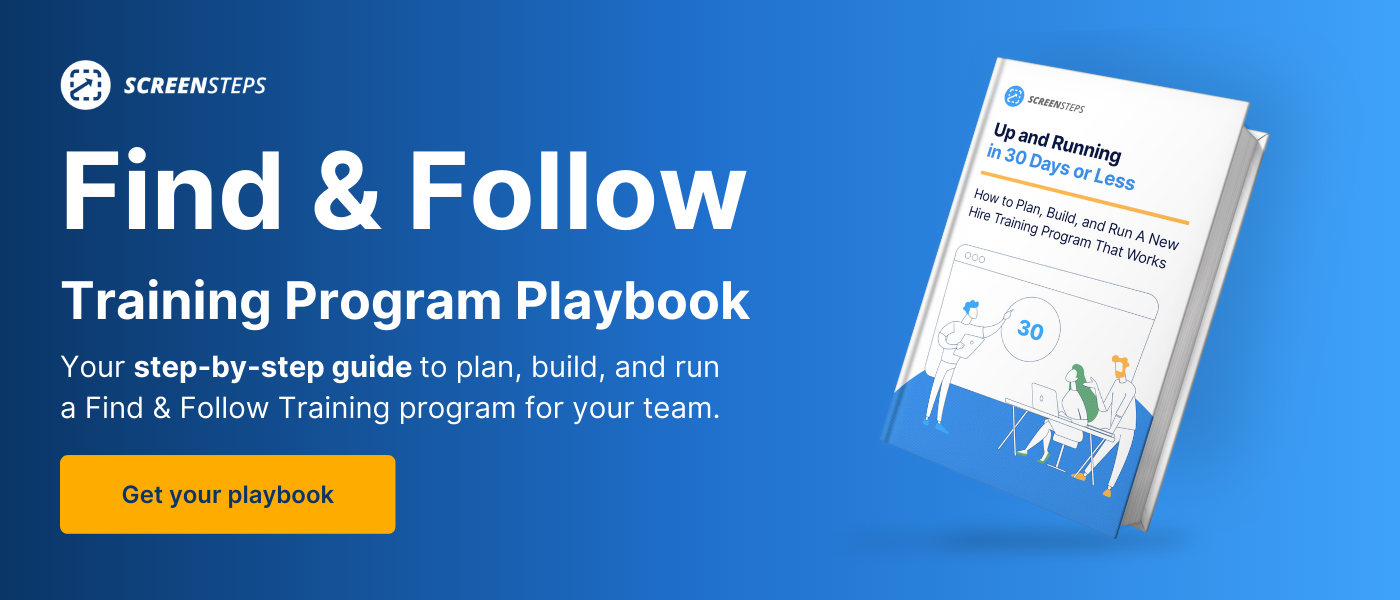What is Knowledge Transfer?
Knowledge is power. In business, knowledge helps your employees do their jobs. So, when knowledge is stuck in one expert’s head, you want to find a way to share it with your other employees.
Enter knowledge transfer.
Knowledge transfer is taking the knowledge that one person has and passing it on to somebody else.
At ScreenSteps — a knowledge ops solution focused on helping companies transfer their knowledge more efficiently — we’ve seen many companies mistake a knowledge transfer problem for a training problem. But, knowledge transfer is a bigger issue than training.
Watch this 2-minute video for a brief introduction to knowledge transfer. Then learn more about knowledge transfer and how you can use it in business with the rest of this blog post.
Knowledge transfer definition
Knowledge transfer is the practice of transitioning knowledge from your experts to other employees so that those other employees are able to confidently and independently handle tasks just like the experts would.
Another name for knowledge transfer is knowledge sharing. That is because it is the act of taking information and sharing it with another person so that they can use that information to do something.
There are many different types of knowledge transfer that companies tend to talk about — namely, tacit and explicit knowledge.
But, we’ve found that there are really two main types of knowledge that impact your operations. Those are foundational knowledge and actionable knowledge.
Foundational vs actionable knowledge
What is the difference between foundational and actionable knowledge? Here’s a quick rundown.
Foundational knowledge
Foundational knowledge is contextual information. It’s the background information that helps your employees gain perspective and basic skills so that they have a foundation to build on.
It is conversational or theoretical knowledge. Once they have that knowledge, they can talk about it, but they can’t do anything with it.
Actionable knowledge
Actionable knowledge is operational or procedural knowledge. It is the information that helps someone handle a task.
These are your how-to instructions that lead to actions and completed assignments.
Actionable knowledge is where most companies struggle.
Ways to transfer knowledge
How do you transfer knowledge to your employees? It depends on what you want to accomplish and the context in which your employees are learning.
There are many different ways to transfer knowledge to your employees. Some common knowledge transfer methods include:
- Classroom training
- Virtual training
- eLearning or video courses
- Digital guides
- Other forms of documentation
- One-on-one coaching
- Shadowing
- Nesting
While all of these are knowledge transfer approaches, not all approaches are as effective as others. That’s why you need a knowledge transfer strategy.
🔎 Related: What Knowledge Transfer Problems Can a Knowledge Ops Solution Solve?
Why you need a knowledge transfer strategy for your business
Often, businesses don’t think of knowledge transfer as part of their business plans. They know they need a training curriculum. They know they need to write down their policies and procedures — but somehow the dots don’t get connected.
A knowledge transfer strategy helps connect the dots. It takes the focus off of having things in place just so they exist and shifts that focus to helping employees do something. It is a more outcome-driven approach that helps businesses focus on the root of the problem.
Building a knowledge transfer strategy takes more than investing in a software solution. It takes the right technology, the right methodology, and the right habits. With that recipe for success, a knowledge transfer strategy could help your company:
- Create reliable employee support materials (i.e. digital guides)
- Prepare employees to work independently
- Train employees more effectively and efficiently
- Reduce training times
- Improve employee performance scores
Transfer knowledge faster with the right software and methodology
Knowledge transfer is an essential part of any business. If you want more effective employees, you need the right knowledge transfer strategy.
To do that, you need to find the right software and the right knowledge transfer framework for your business.
ScreenSteps is a knowledge ops solution. The combination of our knowledge ops platform and Find & Follow Framework has helped companies reduce training times by 50% or more.
Find & Follow involves a specific employee training structure along with clear digital guides to help new hires reach proficiency in 30 days or less.
Want to learn more about the Find & Follow Framework?
Download the free Find & Follow eBook to learn how to build your Find & Follow training program.
.jpg)

.png)

